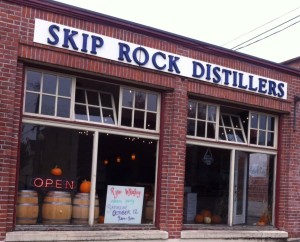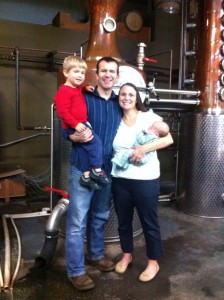A Conversation with Skip Rock Distillers
 With Washington’s unique laws, craft distillers are popping up all over the state. NABC is collaborating with Skip Rock Distillers in an effort to assist those interested in starting a craft distillery. Beginning nearly four years ago at their location in Snohomish, Ryan and Julie Hembree built their family business in a way that promotes local agriculture and truly realizes their talents in distillation and their sophisticated taste for high quality spirits.
With Washington’s unique laws, craft distillers are popping up all over the state. NABC is collaborating with Skip Rock Distillers in an effort to assist those interested in starting a craft distillery. Beginning nearly four years ago at their location in Snohomish, Ryan and Julie Hembree built their family business in a way that promotes local agriculture and truly realizes their talents in distillation and their sophisticated taste for high quality spirits.
Ryan and Julie explain that it is their love of food and drink, local products and the desire to start their own business that got their feet off the ground. Ryan started making beer 15 years ago, received an enology certificate from Washington State University, and also became familiar with Washington’s craft distilling laws through his previous position as agriculture coordinator for Snohomish County. His wife, Julie has been in the beverage industry for 14 years, where she developed and understanding for coffee and flavor profiles through employment at Starbucks. “We wrote our business plan on our honeymoon,” says Ryan. “From there we just started moving forward, really thinking seriously about it in 2007. We went to Louisville, Kentucky and got private lessons from a master distiller.” The Hembrees’ business partners include Ryan’s parents Jim and Cherie Hembree, Dave Hopkins as their in-house “engineer”, and Jeff Leichleiter for processing and marketing help.
 The Hembrees have two young boys, and their business has worked out well for family life. “Because we own our own business it allows us to be flexible enough to be with our family,” Ryan explains. “Sometimes I’ll bring Mason in when he’s not in preschool and he’s able to hang out here at the distillery. We grow our own walnuts and make a product with them. He knows what nocino is. He’s harvested walnuts three years in a row with us. We have pictures of him in his diapers picking up walnuts and putting them in buckets. So, to me business and family are seamless.”
The Hembrees have two young boys, and their business has worked out well for family life. “Because we own our own business it allows us to be flexible enough to be with our family,” Ryan explains. “Sometimes I’ll bring Mason in when he’s not in preschool and he’s able to hang out here at the distillery. We grow our own walnuts and make a product with them. He knows what nocino is. He’s harvested walnuts three years in a row with us. We have pictures of him in his diapers picking up walnuts and putting them in buckets. So, to me business and family are seamless.”
Distillation has a long history in our country. Even the first farmers were familiar with value-added. “Distilling is an agricultural practice,” Ryan adds. “Pioneer farmers had to get their grain crop to market. It’s tough to do. They would get a lot more for it if they learned how to ferment and distill. Even by state law it’s defined as an agricultural practice. So, for us, it’s an extension. We need to feature what’s local.” The Hembrees source as much of their grain as possible from Snohomish Valley. Wheat, rye and triticale are all bought from the valley. They use local berries from Skagit, Whatcom counties, and Snohomish Valley. Almost all of their glassware comes from the US. “Anything we can to keep it local and support jobs here,” Julie says.
 Skip Rock produces a number of liqueurs and spirits, and they released their first potato vodka in 2010. Julie explains, “There’s roughly 13-15 pounds of potatoes in a bottle of our vodka. It has a richness to it because it’s made with Yukon gold potatoes. Next, they released their unique triple-distilled white whiskey, made from triticale, which Julie calls, “Our utility alcohol. Because it mixes with everything.” They started using triticale when a local farmer suggested trying it. “It was that partnership with the farmers for us that said, ‘Hey we’ve got something here, you should try it,’” Ryan said. Released on October 12 of this year, the newest product addition is their Rye whiskey. “That’s a big one that’s been two years in the making,” Ryan says. “It is 71% rye, 29% triticale. We age it for 22 months in 15 and 30 gallon toasted and charred American Oak barrels.” They also have a number of liqueurs including Spiced Apple, Blackberry, Raspberry and Nocino Walnut Liqueur. Julie explains, “We didn’t want to do another sugary-sweet one, there’s so many liqueurs out there where you drink them and you get sugar residual in your mouth, which is not our cup of tea. With the apples we are using pure, unfiltered cider. We do a reduction on it to intensify the flavor.”
Skip Rock produces a number of liqueurs and spirits, and they released their first potato vodka in 2010. Julie explains, “There’s roughly 13-15 pounds of potatoes in a bottle of our vodka. It has a richness to it because it’s made with Yukon gold potatoes. Next, they released their unique triple-distilled white whiskey, made from triticale, which Julie calls, “Our utility alcohol. Because it mixes with everything.” They started using triticale when a local farmer suggested trying it. “It was that partnership with the farmers for us that said, ‘Hey we’ve got something here, you should try it,’” Ryan said. Released on October 12 of this year, the newest product addition is their Rye whiskey. “That’s a big one that’s been two years in the making,” Ryan says. “It is 71% rye, 29% triticale. We age it for 22 months in 15 and 30 gallon toasted and charred American Oak barrels.” They also have a number of liqueurs including Spiced Apple, Blackberry, Raspberry and Nocino Walnut Liqueur. Julie explains, “We didn’t want to do another sugary-sweet one, there’s so many liqueurs out there where you drink them and you get sugar residual in your mouth, which is not our cup of tea. With the apples we are using pure, unfiltered cider. We do a reduction on it to intensify the flavor.”
Julie notes that that there wasn’t a whole lot of help out there when they were just learning about distilling, relying on moonshining books just to learn the basics. In July of this year, Skip Rock Distillers and NABC held a workshop titled “The Business and Art of Craft Distilling”. As Julie describes it, “Being that it is still a pretty small industry, we built great relationships with the initial core group of people. They were invited to come out and present their specialty. It was great because it wasn’t too big of a class. There were just enough people where everyone could come in, ask the questions they needed to, and they got to practice doing it. The cost compared to other workshops was less, and set at a realistic price for someone who is starting a business. It gives people a chance to come and see if this is what they want to do. The workshops are a lot of fun for us. We want people to succeed at it and not struggle through it as this helps the industry as a whole.”
For more information on Skip Rock Distillers and their products, visit their website at www.skiprockdistillers.com.
For information on The Business and Art of Craft Distilling workshop, visit the Northwest Agriculture Business Center’s website at www.agbizcenter.org.
